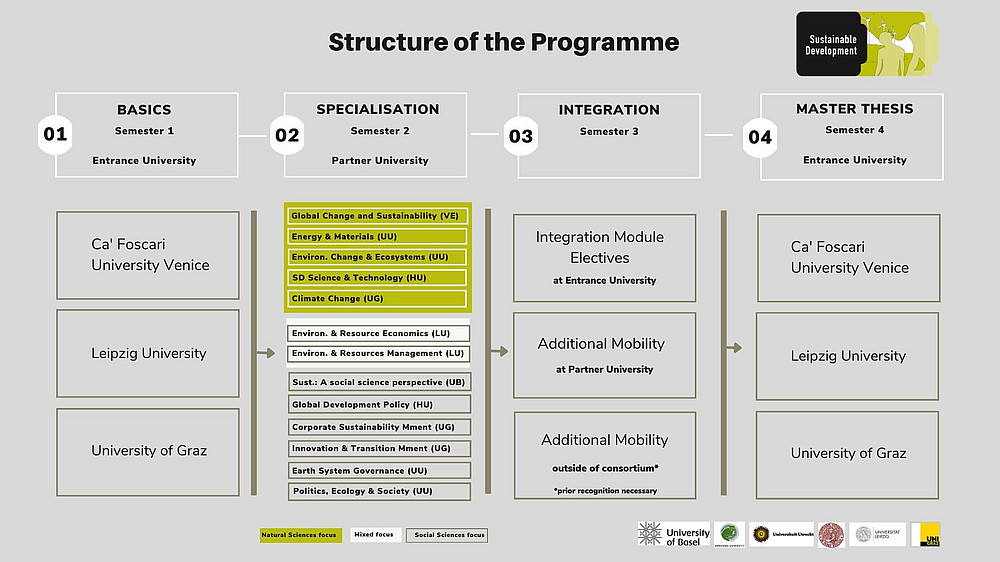Joint International Master in Sustainable Development
Programme information
A Joint Programme is offered jointly by several higher education institutions. You can choose one of the degree-awarding universities as your entrance university where you will be enrolled and a mobility university for your specialisation according to your academic background. You must complete at least one semester at your mobility university. This allows you to highly specify on different modules and specialisation tracks that are of interest to you.
The programme also offers a joint degree option. Within this option you can also choose Hiroshima University as entrance university. For more information check out the following website.
Students of the Master’s programme usually attend the module "Basics in Sustainable Development" (30 ECTS) in the first semester and the "Integration Module" (30 ECTS) in the third semester at their entrance university (the university where you enroll). The courses in these modules aim to put disciplinary insights and approaches into the right context while learning to work in teams on assigned projects.
Each specialisation track of the programme (second semester, 30 ECTS) includes a specific number of courses that provide you with theoretical depth and a solid foundation in research methodology, techniques and skills. Elective courses further deepen this knowledge.
The independent final research Master's thesis comprises 30 ECTS credits. A research internship can be part of this final thesis (after consultation with the academic coordinator and/or supervisor).
Module descriptions
Basics in Sustainable Development
All students of the Joint International Master in Sustainable Development must take the introductory module ‘Basics in Sustainable Development’ (1st semester) at their chosen entrance university. By attending the basic module, you gain a comprehensive overview of the concept of sustainable development, ranging from local to global processes, including the history of the concept and various ways it can be operationalised. You also acquire a basic knowledge and skills in policy analysis and policy evaluation, as well as of various relevant scientific disciplines and understand their contributions to the field of sustainable development and the ability to integrate them.
Specialisation tracks
Each specialisation track (2nd semester, mandatory mobility) pays attention to the theoretical background, appropriate research methodology, and intervention methods of a specialised field within the framework of sustainable development. You specialise in natural or social sciences (or a mix of both) depending on your academic background. You deepen that basis by attending further optional courses from the curriculum
Integration Module
The integration module (3rd semester) combines the different scientific approaches, involves you in inter- and transdisciplinary case studies on sustainable development, and prepares you for the Master's thesis in the fourth semester through its strong research orientation.
Master's thesis
The Master's thesis module (4th semester) comprises 30 ECTS credits. The thesis reflects your mastery and academic development at a sufficient level and is an essential training, which involves a variety of academic activities: formulating a research objective and question after reviewing the literature; sorting, interpreting, and synthesising information; collecting/analysing measurements/observations; and presenting oral/written reports of findings, if required by the respective regulations of the entrance university. A research traineeship may be part of the final thesis project. ! Check out the website (download section) for further information about the role of the second reader.
Partner Universities
The Joint International Master’s Programme in Sustainable Development combines the teaching specialisations and research fields of six high profile partner institutions. The universities work together to guarantee a high-quality international curriculum with regional aspects.


Admission requirements
You need a Bachelor’s degree or a degree from an equivalent programme of at least 180 ECTS in engineering, natural sciences, environmental sciences, economics or social sciences.
As applicant you must demonstrate your research skills, basic knowledge of the natural and/or social sciences, and a general understanding of the thematic areas of sustainable development and intervention strategies.
Joint Degree Option with Hiroshima University
As part of the master's programme, there is the unique opportunity for four students per cohort to obtain a Joint Degree between the Universities of Graz and Hiroshima or Leipzig and Hiroshima.
Within this Joint Degree option you must complete 60 ECTS at one of the European partner universities (Graz or Leipzig University) and 60 ECTS at Hiroshima University. This allows you to highly specify on different modules and specialisation tracks that are of interest to you.
English requirements
For non-native English speakers, evidence of English language proficiency conform to the admission requirements is required:
- TOEFL 93 (internet-based test);
- IELTS (academic test) score 6.5 (and not less than 6.0 in the writing section);
- Cambridge EFL (English as a Foreign Language) presenting one of the following certificates: Cambridge Certificate in Advanced English (minimum 180 points), Cambridge Certificate of Proficiency in English (minimum score C1).
Exception: English-native-speaking applicants (School-leaving qualification in an English-speaking country) and those who successfully completed an English-taught Bachelor's/Master's programme.
More information can be found on the site REQUIRED DOCUMENTS
Preparation for tracks
Adequate preparation for natural science tracks might include courses in biology, chemistry, earth science, geography, geology, physics, or technical sciences.
For the social science tracks, as prospective student you might have taken courses in economics, human geography, law, management, planning, political sciences, or sociology.
Specific admission requirements for Leipzig University as entrance university
- You need a Bachelor’s degree focusing mainly on economic, social, earth or natural science and related to sustainability topics (this reference can also be proven by corresponding professional experience); and
- professional experience of at least one year after completion of your Bachelor’s degree.
For more information about the specific admission requirements check out the website of Leipzig University.
